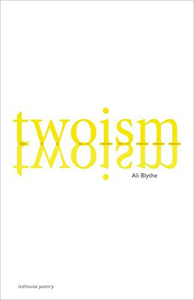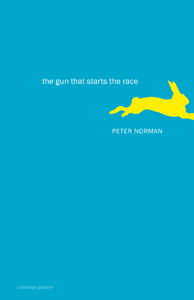Reviews
Poetry Reviews by Anouk H. Henri
Ali Blythe, Twoism (Fredericton: Goose Lane, 2015). Paperbound, 68 pp., $19.95.
Peter Norman, The Gun That Starts the Race (Fredericton: Goose Lane, 2015). Paperbound, 64 pp., $19.95.
 At the heart of Ali Blythe’s courageous debut collection is a bruising search for identity. At times the self is revealed as a thing of tricks and shadows—illusory, fragile, and unreliable. The narrator identifies with St. Jude, patron saint of lost causes, and periodically slips into a familiar melancholy, beyond consolation. Elsewhere, we hear the voice of someone in search of an exit: “Make me a light breeze / is all I’m asking.” The here and now is deeply unsatisfying. Something better than this, we’re told, must exist. The poems create a world prone to unravelling, one that leaves us with little to hold onto. Home is transient, with hotels, hospitals, and “… the leaky dock my whole family / has lived on since the beginning” forming a common backdrop. Reality is like a cloud or phantom; the body a fluid, disposable entity offering “the worst / kind of elusive structure.” Various masks and identities are tried on for size, including some from the animal kingdom. Perhaps being a fox or an owl is better. In any case, that apt expression, être bien dans sa peau, doesn’t apply here.
At the heart of Ali Blythe’s courageous debut collection is a bruising search for identity. At times the self is revealed as a thing of tricks and shadows—illusory, fragile, and unreliable. The narrator identifies with St. Jude, patron saint of lost causes, and periodically slips into a familiar melancholy, beyond consolation. Elsewhere, we hear the voice of someone in search of an exit: “Make me a light breeze / is all I’m asking.” The here and now is deeply unsatisfying. Something better than this, we’re told, must exist. The poems create a world prone to unravelling, one that leaves us with little to hold onto. Home is transient, with hotels, hospitals, and “… the leaky dock my whole family / has lived on since the beginning” forming a common backdrop. Reality is like a cloud or phantom; the body a fluid, disposable entity offering “the worst / kind of elusive structure.” Various masks and identities are tried on for size, including some from the animal kingdom. Perhaps being a fox or an owl is better. In any case, that apt expression, être bien dans sa peau, doesn’t apply here.
Many poems are written in the first- and second-person singular—I and You. Is this other person real, imagined, or another dimension of the self? Given the narrator’s antagonistic relationship with the self and the tendency to retreat into someone else, it’s hard to tell. Parts of Twoism are charged with a heady eroticism that is all the more intriguing for its polarity. Blythe invites us to take a second look at our sexuality and reminds us that for anyone stepping outside social norms, there’s little to guide us beyond morality or clinical classification. It’s perhaps indicative of the West’s 2,000-year history of straitjacketing human sexuality that the book refers back to classical mythology—most notably Hermaphroditus—for another point of view.
The experience of being transgender appears precious and monstrous, painful and rare, something to be treasured and corrected with hormone blockers and surgery. Twoism tantalizes us with a rare and bittersweet glimpse into what being or having a “sweetly familiar / two-in-one” might mean, only to crash land into a sterile scent of “sex and chlorine.” Reading Twoism is a lot like being a figure in an Escher drawing, and it’s easy to get lost in the many contradictions and reversals of perspective. With so little firm ground underfoot, life feels like quicksand, an existential trap between the polarities of masculine and feminine. What you’re left with is a stark feeling of longing and futility, of someone held hostage in their own skin.
 Poetry is sometimes described as a path to the outer edge of experience. In The Gun That Starts the Race, Peter Norman takes us on a white-knuckle ride of all things decayed, broken or sickly, from prisons, rats, and gnawed extremities to carrion, bug infestations, and scabbed-over veins. What makes this book so enjoyable is Norman’s willingness to approach taboo or unsavoury subjects on his own terms. Death, dressed in a shifting coat of fog and black tie, is an old friend; and the “awful torque” of a maggot writhing in compost leaves you feeling more admiration than anything.
Poetry is sometimes described as a path to the outer edge of experience. In The Gun That Starts the Race, Peter Norman takes us on a white-knuckle ride of all things decayed, broken or sickly, from prisons, rats, and gnawed extremities to carrion, bug infestations, and scabbed-over veins. What makes this book so enjoyable is Norman’s willingness to approach taboo or unsavoury subjects on his own terms. Death, dressed in a shifting coat of fog and black tie, is an old friend; and the “awful torque” of a maggot writhing in compost leaves you feeling more admiration than anything.
At home in the lousiest of places, the poet nevertheless tempers grit with boyish charm to give you poems that are surprisingly upbeat. Norman isn’t a poet to mourn lost innocence or rosier times, and though tough, he’s neither morbid nor aloof. In fact, his writing displays a raw, feverish quality, and the cracking pace rarely lets up. The language is dense and chewy, the taut lines made lively with alliteration, rhyme, and rhythm. Lexically rich, the poems show range and a real flair for the dramatic. There’s an “animal zest” for blood and guts that might grow tiresome in less-skilled hands. “Hymn for the Slaughter of the Daisies” is more battle cry than praise; less “O, Come All Ye Faithful” and more akin to the St. Crispin’s Day speech in Henry V. How else to read:
“Rev up the mowers, lads, cinch the straps
and buckles of your gear;
swab the very eyelets on your shoe.”
(Imagine Laurence Olivier reading these lines and lawn maintenance will never be the same again.) Speaking of Shakespeare, the sonnets “Church,” “Potter,” and “Age of Waiting” are all excellent, while “Bolshevik Tennis” is mind-bendingly fresh and hilarious—perhaps the funniest poem I’ve read, ever.
Occasionally, you think Norman writes like a man consumed, hungry for carnage or chaos or some apocalyptic experience you’d rather not think about, and yet, these poems will leave you glad to be alive. All told, The Gun That Starts the Race gives us a madcap antithesis of every material comfort and fantasy we’re supposed to want, so that by the end of it the book feels like an equal measure of Macbeth and Adbusters with a side of comedy thrown in. Norman plays the role of friendly usher to every dark and grimy corner of the earth with a welcome dose of gusto, humour, and compassion.
—Anouk H. Henri









